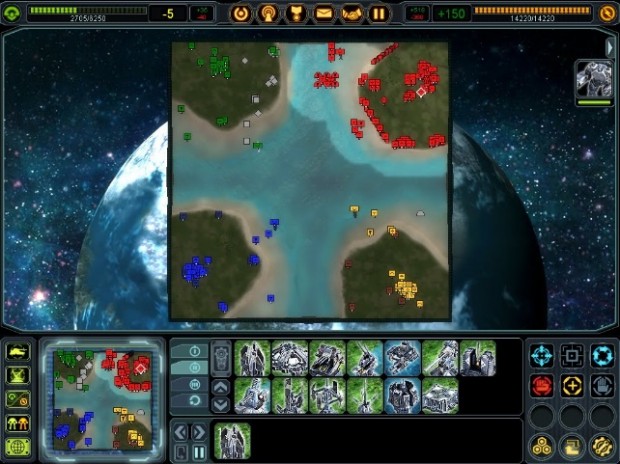One of my passions, which I think is shared by a lot of people in the SEM industry, is gaming. Specifically real-time strategy games, like StarCraft and Command & Conquer. Many people may not realize it when playing their favorite strategy game, but there are a lot of skills you can pick up subconsciously and apply to your SEO campaigns, and I want to talk about that here.
Games have a long history as teaching tools, stretching back to the precursors of chess in Egypt and India as much as 3,000 years ago. Much like the modern version of chess that we all know, these ancient board games focused on the concepts of warfare, unit management, and calculating acceptable risk. They taught critical thinking skills, strategizing, and thinking several moves ahead – all skills that have applications in everyday life. Perhaps that’s why some of the best and brightest minds in the computer, medical, business, and education fields (among others) continue to love chess so much today.
The modern chess board has been turned into a virtual battlefield with real time strategy games like StarCraft,
 SupCom- pretty much legit SEO training.
SupCom- pretty much legit SEO training.
Command & Conquer, and Supreme Commander. While battles happen in real-time as opposed to the turn-based moves in chess, the skills taught and honed through victory and defeat are the same. In fact, new research proves what we strategy gamers have known all along: playing strategy games is good for the brain. The study showed that playing difficult strategy games (StarCraft 2 was used) increases the speed of perceptual processing and improves cognitive flexibility. Increased perceptual processing means that RTS gamers can break down and process complex stimuli faster. And, cognitive flexibility has been called “a cornerstone of human intelligence” by Dr. Brian Glass, one of the authors of the paper.
H’okay, So…
What does all of this have to do with SEO? Lots! Developing a solid foundation of critical thinking skills, along with information management and multi-tasking skills, is very beneficial for people seeking a successful career in SEM, where logical trains of thought, testing, and long term planning are required. Juggling multiple dashboards of information, sifting through long strings of backlink and ranking data, and managing troop resources, both in-house and off-site, are critical skills that apply to the every day SEM.
In addition to developing raw skills like thinking on your feet and swiftly adjusting to new developments, games like chess and StarCraft teach players the importance of developing overall strategies, as opposed to “just seeing what works.” Developing smart marketing tactics and ranking strategies is paramount in SEM.
Managing Information and Multitasking
RTS games are an overwhelming display of all kinds of data, all of it relevant, but not all of it immediately useful. In SEO, unfortunately, our tools are much the same. The player’s task is to determine what’s important right then, and then moments later completely shift their attention in the middle of the battle. In good matches, this can happen dozens or hundreds of times, as successful players shift their focus between multiple skirmishes, their own base, and their resource collection. In SEO, we have to juggle 8 or 9 different tools simultaneously – spreadsheets, Word doc reports, text editors, SERP ranking tools, multiple Analytics and Webmaster Tools profiles, social profiles, client website back ends and front ends, and project management suites. It’s overwhelming how many programs are being juggled at any given moment.
Learning to deftly multitask and switch your focus in RTS games is an overlooked skill that can be directly applied to your SEO career every day.
Unit allocation
Pick the right unit for the right task. Never overwhelm your units. Units are valuable – retreat and repair when need be. In business terms: different employees excel at different tasks. Some are more creative, some more analytical, some more technical. Don’t send your creative person to fix a technical problem and vice versa. Don’t overwhelm your best employees with too many tasks – they will burn out and the work will suffer. Pull them out of their work from time to time to give them a break. Give them an extra break after a task, take them to lunch, bring in coffee and breakfast, or go on a group social outing. Get them “repaired and refueled.”
Resource management
Manage your rate of income vs. expenditure on things you want or need (tools, new website designs, business cards, the fulfillment of services, ads, etc.)
Don’t stall your economy! It’s easy for many businesses to overspend in their early days and “stall their economy” – meaning, the rate of income or resources coming into the business is lower than the rate of expenses going out. If you can’t afford to build more troops in a game it’s game over. In business, if you’re spending more than you’re making, your business will soon collapse from debt. Don’t stall your economy!
Different Strategies
- Zerg Rush
This is the tactic of “hitting the ground running” when you’re small. Very low cost, units are not very effective, but overwhelming numbers prevail. This is effective in games and effective in real-life business for getting your name out and getting early victories. Think posting flyers, going door-to-door, mailing postcards, hiring a lot of untrained salespeople (churn and burn is an issue).
- In SEO, this could be either targeting low-hanging fruit like directory submissions, profile links, and comments. Or, it could be seen as link spam – many, many low-quality links quickly overwhelming your competitors through automation. This strategy can backfire now, but it’s worked for more than a decade as an easy way to rank quickly. Like dumping Tier 1 units in RTS games, you would need to keep sending links to replace the dead ones that rapidly get de-indexed and drop off the graph.
- Turtle method
When someone “turtles” in a game, they retreat behind the safety of their bases’ defenses (their “shell”) to focus on building up their base without aggressive expansion. In business, if you follow a similar strategy, you’d withdraw from the outside world, focusing on your business’s internal operations. In practical examples, this would work before a product launch, or if your business is content-based (building up a blog or eStore, writing a book or script or music), or if you take a sabbatical to re-examine your operations. You’re working on your own projects, not chasing prospects or servicing clients.- Cons:
Slower than Zerg Rush. Difficult to manage resources (money doesn’t come in on its own, you will have very lean times, it may seem like you’ve lost your grasp of the larger “game” as you focus internally), leaves you open to missing opportunities the Zergs find early on as they rapidly expand. - Pros:
Builds up a solid foundation for the late-game strategy. In the later game, your processes and machines are in place, things are largely on auto-pilot. It’s time to embrace all of the newcomers in the niche and crush them with your huge index count, good PR, and high DA (see: any large blog networks, big industry resource sites, news sites, successful product launches, etc.)
- Cons:
- Tech
This strategy is to “tech up” as quickly as possible, always staying ahead of the competition. This is a delicate one to balance, especially with resources. Business Tools (tech levels) get more expensive as your operation grows. You must focus internally on all processes to eke out as much money/resources as you can, while also expanding to maintain your machine’s fuel. This means chasing clients and proactive marketing, but to a lesser degree than the Zerg rushers. Tech strategists need to plan more carefully calculated expansions. More expensive marketing options – PPC, retargeting, distributed banner networks, offering affiliate programs, offline marketing, etc. – take longer than the low-cost, low-yield, high-volume tactics of the Zerg rush strategy. Teching Up as a strategy takes longer to gain traction, but not as long as Turtle.- In SEM, these are the people on the bleeding edge, the first people to recognize long ago the connection to link building with rankings; the people who figured out the PageRank formula; the people first to adopt social platforms and widgets for SEO; first to adopt Authorship and microdata tags before there was a plugin to do so. This “Tech” they use to level up their operations gives them some significant advantages in the late game vs. the other two, as long as they can fight on two fronts.
Testing strategies
Test, test, and re-test. In Starcraft and Command and Conquer, the ways to win or lose are nearly limitless. The open board allows you to try many different strategies until you succeed. In SEO, you must always be testing your strategies to figure out what works and what doesn’t. In life, as in StarCraft, you will fail at some things while you succeed at others. It is important to analyze why you failed, learn from the experience, and test a new strategy until you succeed. There are so many factors to consider in a site’s success or failure that it becomes difficult to comprehend. The key is to test everything: your outreach pitch; your backlink building strategy, your content length, keyword use, outbound link count, etc. Split-test your landing page elements: the graphics on the page, the length of the page, the copy, the offer, lead capture requirements. Test it all!
- Relying on the power of community: In SEO as in strategy games, there are many sites dedicated to mastering our craft, filled with the knowledge and strategies of those who have gone before us. Learn from their detailed tactics, apply them, and enjoy success. Learn why they work where they work. Not every strategy works across every website or every RTS map. Adapt proven strategies to your situation. Some good places to start are Moz.com, Search Engine Land, and SEOBook.
You may lose the battle, but you can still win the war.
Take heart during failures and realize you’re not down and out. Many games have seen clutch victories, with successful breakout victories from Turtles and Techs after they hit their strides late in the game. In business, you may lose a client’s rankings, and you may screw up their site. These things can usually be fixed. You may even lose a client. Analyze what went wrong, determine how you can fix it, and pull yourself up and get ready for the next challenge – because there will always be one.[/fusion_builder_column][/fusion_builder_row][/fusion_builder_container]





